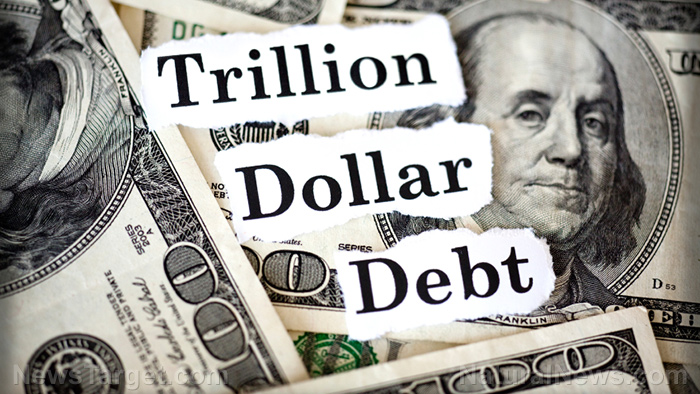
Fred Smith, the founder of executive chairman of shipping giant FedEx, is the latest business leader to sound the alarm that if America’s ballooning public debt is left unchecked, it will threaten to spiral into a catastrophic crisis.
(Article by Tom Ozimek republished from TheEpochTimes.com)
Mr. Smith was asked during an interview on Fox News for his opinion on projections from the Congressional Budget Office (CBO) that U.S. federal debt held by the public will go from 99 percent of gross domestic product (GDP) in 2024 to a record 116 percent in 2034, before pushing above 170 percent by midcentury.
He replied by saying that warnings about the level of government spending adding to America’s public debt are both serious and growing and, “hopefully, I’m adding to the chorus and saying this is unsustainable.”
Recently, JPMorgan Chase CEO Jamie Dimon warned that out-of-control spending in Washington threatens a government default that could trigger a “rebellion,” while billionaire investor Ken Griffin said that trying to print more dollars to deal with the possibility of a default would push the economy into a “deep tailspin."
Under President Joe Biden’s term in office, the national debt has jumped by more than $6.3 trillion (and $7.8 trillion under former President Donald Trump)
‘Catastrophic Fiscal Crisis’
Mr. Smith told Fox News that America’s ability to print money depends on the dollar remaining the world’s foremost reserve currency, but that this is increasingly at risk.
“The so-called BRICs alliance—Brazil, Russia, India and China—have set out on a deliberate course to dethrone the dollar,” Mr. Smith said. “If that happens and we can’t sell our bonds, I can assure you the living standards that we all enjoy today are going to be a thing of the past."
The Fox News host then recalled Mr. Smith’s remarks at an event in December, when the FedEx chairman said that he hoped political leaders in Washington could recognize the “unprecedented dangers” that the country faces in terms of political and financial instability, and would have enough common sense to take steps to avoid a “catastrophic fiscal crisis.”
Asked whether he sees the wisdom to avert a catastrophe in today’s political leaders, Mr. Smith said: “no, quite the contrary.”
While a number of captains of industry have warned about the need to put America’s fiscal house in order, Treasury Secretary Janet Yellen said recently that she doesn’t think the federal government needs to cut deficit spending and balance the budget to put the country on a fiscally sustainable path.
Ms. Yellen’s remarks came during a Feb. 6 appearance before the House Financial Services Committee, when asked if the U.S. budget would ever be balanced over the next 50 years to bolster the country’s financial standing.
“I don’t think the budget needs to be balanced,” she said during an exchange with Rep. Pete Sessions (R-Texas). “The U.S. budget does not need to be balanced to be on a fiscally sustainable path.”
Ms. Yellen said at the hearing that President Joe Biden’s deficit-reduction economic policy proposals would help “guarantee” the government is on a sustainable path by ensuring the national economy is growing.
Her remarks—and the warnings from business leaders—come as the annual interest payments on America’s public debt have exceeded the $1 trillion mark and as the national debt has broken above $34 trillion.
Recent CBO projections show that federal debt held by the public as a percentage of GDP is expected to hit 172 percent by 2054.
CBO Director Phill Swagel said in remarks about the budget outlook that interest payments on U.S. government debt would rise to around $1.6 trillion within a decade.
“Net interest costs are a major contributor to the deficit, and their growth is equal to about three-quarters of the increase in the deficit from 2024 to 2034,” Mr. Swagel said.
“Initially, net interest costs are similar to the amounts of discretionary spending both for defense and for nondefense activities. By the end of the period, they are roughly one and a half times larger than each, at $1.6 trillion,” he added.
While some in the executive branch downplay the danger of budget deficits, Congress appears to be moving closer to at least establishing a commission to consider steps to rein in out-of-control spending.
Debt Commission
The Republican-led House Budget Committee recently voted 22–12 to create a 16-member commission that would submit fiscal policy recommendations.
Rep. Jodey Arrington (R-Texas), the House Budget Committee chair, blamed both parties for being fiscally irresponsible.
“We are all in this boat together. The boat is sinking. Our unsustainable national debt is the greatest challenge of the 21st century,” he said.
The commission has been tasked with assessing ways to balance the federal budget promptly.
One of its aims is to propose ways to enhance the long-term solvency of various government programs, in particular Medicare and Social Security.
Analysts at the University of Pennsylvania estimate that when the debt-to-GDP ratio hits around 200 percent, it will hit the point of no return. That’s when no amount of future tax increases or spending cuts could prevent the government from defaulting on its debt.
“Unlike technical defaults where payments are merely delayed, this default would be much larger and would reverberate across the U.S. and world economies,” they explained.
Under a best-case scenario, the University of Pennsylvania analysts estimate that the United States has around 20 years to take corrective action before the growing debt spiral spins out of control.
Andrew Moran contributed to this report.
Read more at: TheEpochTimes.com
Please contact us for more information.















